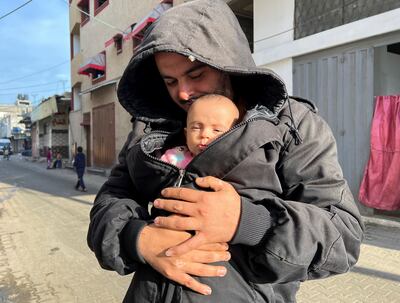Live updates: Follow the latest news on Israel-Gaza
Gazans have expressed mixed emotions over leaflets dropped on parts of Khan Younis on Wednesday by the Israeli army, which feature verses of the Quran.
The verse itself, "and the flood carried away the wrongdoers", comes from surat Al Ankabout, a chapter narrating the story of the Prophet Noah, who escaped God's punishment of sinners by drowning them in a flood.
Amjad Al Fayoumi, a resident of Khan Younis who received the leaflet, said there were "no instructions pertinent to us and whether we should stay here or move elsewhere".
"It sounds like they were trying to mock us," he added. "I don't know who they are trying to refer to with the word 'wrongdoers'."
Saleh Al Jafarawi, another Khan Younis resident, told The National: "It's not clear what they mean. Are they trying to employ some sort of psychological tactic?
"It's silly and trivial of them to use a verse from the Quran, which they don't even understand the context of, or when it was revealed. They don't even know what the next verse is."
Another post on X, formerly Twitter, read: "The Israelis seem to be directing this verse at civilians. Israel wants to deliver a message to the people that they would be lost in the flooding that Hamas's operation was named after," a reference to the so-called Al Aqsa Flood of October 7, when the militant group stormed southern Israel.
"But we tell them that this narrative has no impact on us – we're martyrs to God," the post added.
The Israeli army rejected The National's request for comment, though earlier a spokesman did not deny reports that Israeli forces are considering killing Hamas fighters by flooding their underground tunnels.
Displaced Gaza city resident Mshahed Abu Tarabsheh, who is now in Khan Younis, said Israeli attempts at delivering threatening messages to Palestinians in Gaza were falling on deaf ears.

"The Israelis couldn't reach the resistance fighters, so they took it out on civilians. They want to tell us, the displaced, who lived through two wars – in Gaza city and now in Khan Younis – that Hamas is the oppressor and wrongdoer and that they're the ones responsible," she said.
"But we know who the wrongdoers are. We don't need to explain this to them and they won't get their messages across, no matter how many leaflets they drop on us."
Children learn sounds of shelling
The continuing war, which has killed more than 16,200 people so far, including at least 7,000 children, has had wider implications on Gaza's young, who were once oblivious to the horrors of war.
They can now distinguish between types of shelling, a Palestinian Red Crescent photographer told The National.
Mohammad Mansour, who is also a father, has been documenting the war since it began, accompanying medics as they respond to emergencies.
His family home was partially destroyed and is uninhabitable. They moved to his brother's house, which was subsequently destroyed in air strikes. Mr Mansour decided to bring his family to Al Amal Hospital, where they have been for 60 days.
"When my son used to ask me about the sounds he was hearing, I kept telling him 'they're people celebrating nearby'," he said. "'Shots fired during weddings and birthdays.' Then he questioned why the sounds are becoming stronger, and why the celebrations are scary."
Mr Mansour said his four-year-old son Ahmad has learnt to distinguish between air strikes and tank fire.
"This is the language they're now using and used to," he said. "This is going to have a massive impact on the children of this war, if they survive. It's going to change who they are, how they think and how they grow."
